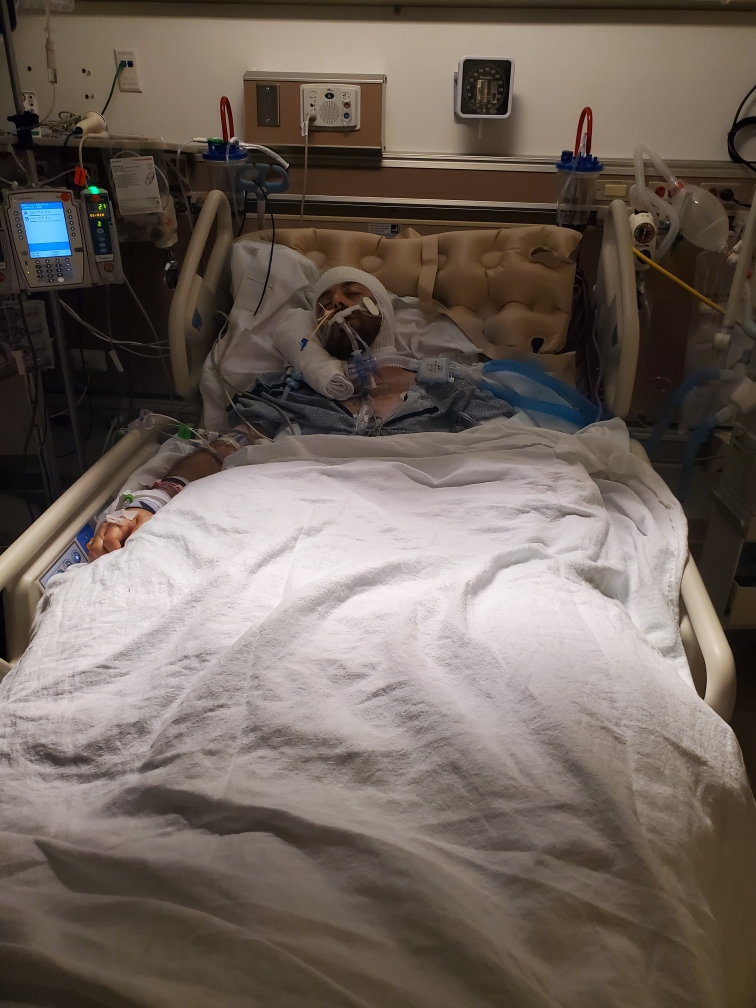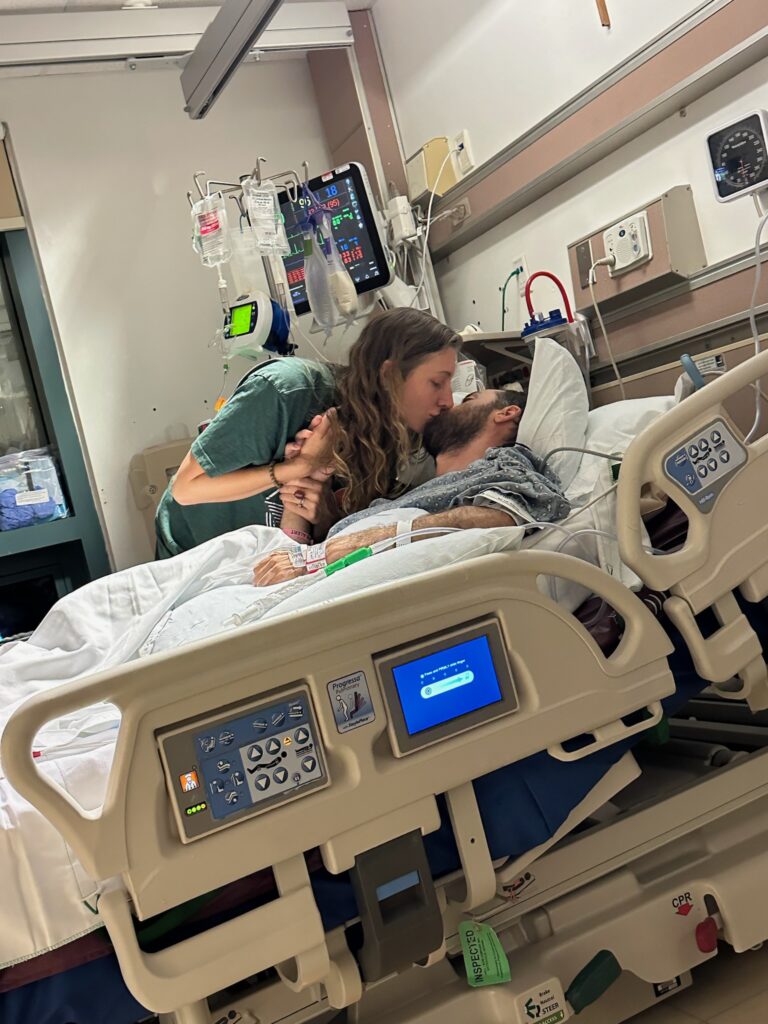I want to thank everyone who has been taking the time to read and share Butler’s story. Writing this story out has been emotional and therapeutic for the both of us. I have Butler read every post before it goes live, and there are a lot of things he does not remember, so it’s helpful for him to be able to read his own story.
**This post contains pictures that may make some viewers uncomfortable.**

For 7 days after Butler’s craniotomy and tumor resection, he was in a medically induced coma and intubated. He was depending on a ventilator to breathe for him. Every morning, the nurses would see how his lungs could function without the ventilator, and every morning was a decision to keep him on it. The more days went by, the more nervous I became. What if his lungs didn’t heal? I started to ask the doctors what happens if his lungs never get to a point where they could function off the ventilator? I never got a straight answer, and looking back, I think it’s because the actual answer would have been very grim. As they tested his lungs each morning, they would decrease the dose of sedative keeping him under just slightly. If I was there, I would talk to him, and he would squeeze my hand!! Sometimes he struggled, especially towards the end of his sedation. I think his body and brain was OVER IT. One frightening detail was that he had to be restrained while he was intubated, and one day I realized why. They decreased his sedative, were adjusting his position in the bed, and he was”awake” just enough to try to rip the intubation tube out of his throat. So yeah, he had to be restrained. I don’t know anyone who would want a tube down their throat though, the entire situation is wildly uncomfortable.

Finally, on day 8, the nurses tested his lungs again. He had myself, and his Aunt Kathy with him. The goal was to let his lungs function on their own for 30 minutes without the ventilator. They decreased his sedation, and slowly decreased the amount of oxygen coming from the ventilator. Me and his aunt stood one on each side of him, cheering him on, watching the minutes go by on the clock. The closer we got to 30 minutes, the more we cheered. It was the most hope we had felt in a week. The more his sedation wore off, the more uncomfortable he became because he still had the intubation tube down his throat. After 30 minutes everyone in the room cheered because HE DID IT!!!! I cried with joy.
I was so thankful to have my husband back with us. That week where he was in a coma, I had never felt more alone. I think it’s easy to take the most simple things for granted sometimes, and it’s not until you realize how easy it is to lose, that you realize how special they are to you. All I wanted was to hear his voice, to hear him tell me he loved me. I wanted to walk down our street holding hands with him and our kids again, like we did every day before. I wanted to hug him and hold him. These most basic things suddenly felt so far away, and that was one of the hardest parts of this situation. The most mundane things of your everyday life are actually so, so precious. This experience truly put our life into perspective for me

It was difficult for Butler to talk for a few days, understandably. We didn’t know it then, but his voice would never completely come back. Very small percentages of people who are placed on a ventilator experience damage to the vocal cords that are permanent. He can speak clearly, but his voice sounds different, and he cannot project his voice like he used to be able to. Now that he was awake, we could evaluate his brain function, among other things. We learned that his vision was impaired. He lost any left sided peripheral vision in his left eye. It took about a year for us to learn that the vision loss was from his surgery, and not his stroke. If it was from his stroke, it would have regenerated. His tumor was pressing on his right eye, and the surgeon had to move an optic nerve to get the entire tumor. He also had some left sided weakness from his stroke.
Butler’s heart was still weak, and needed time to heal and gain strength. So at this point, we were waiting for his heart to heal, his lungs to heal, and his brain to heal. But we were making progress in the right direction! Considering everything Butler had gone through, it truly was a miracle that he was doing as well as he was. I was worried about his memory; would he remember us? What WOULD he remember? He did not remember much of anything from the last 9 months before he went to the ER. He could tell me when we got married, his birthday, he knew we had 2 children. But those 9 months were just blank in his mind. He did have short term memory issues, which has definitely improved over time. It is amazing to see how the body can heal from even the most traumatic events over time. 18 months later, Butler’s heart is doing amazingly well, as are his lungs and brain.
Butler started physical therapy as soon as he could. It took a day or so after he woke up to get some nutrition into him. He had been given nutrients through a feeding tube while he was intubated and still had to stick to a liquid diet while his throat healed. He had to learn how to walk again, especially given the left sided weakness from his stroke. From day one, he was determined to get back on his feet and be independent. Butler is not a man who enjoys having people taking care of him and waiting on him. His strength and determination amazed me.
Part 4 is coming soon!
You can find part one of Butler’s story here: Butler’s Brain Cancer Story – Part one and part two here: Butler’s Brain Cancer Story Part 2

